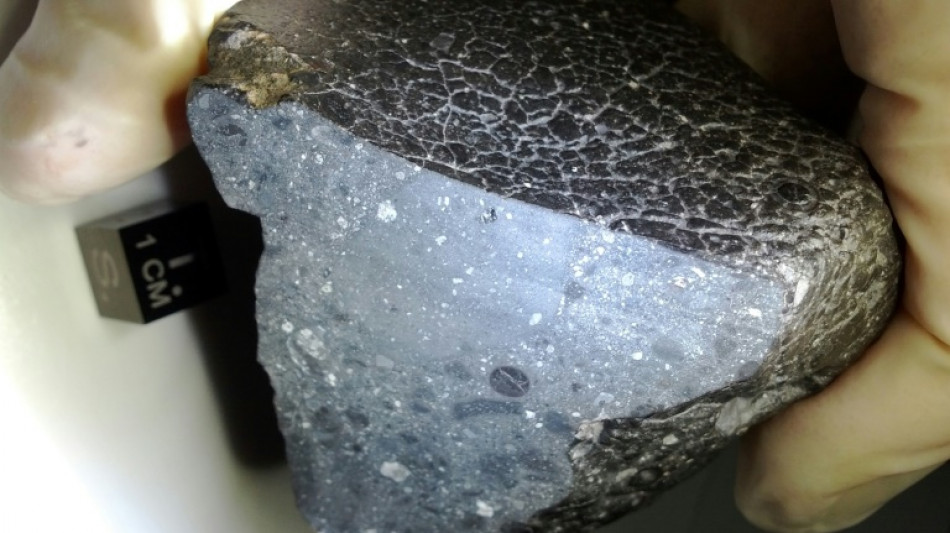
-
 Le Pen says days of new French govt numbered
Le Pen says days of new French govt numbered
-
Global stocks mostly rise after US tech rally

-
 Villa boss Emery set for 'very difficult' clash with Newcastle
Villa boss Emery set for 'very difficult' clash with Newcastle
-
Investors swoop in to save German flying taxi startup

-
 How Finnish youth learn to spot disinformation
How Finnish youth learn to spot disinformation
-
South Korean opposition postpones decision to impeach acting president

-
 12 killed in blast at Turkey explosives plant
12 killed in blast at Turkey explosives plant
-
Panama leaders past and present reject Trump's threat of Canal takeover

-
 Hong Kong police issue fresh bounties for activists overseas
Hong Kong police issue fresh bounties for activists overseas
-
Saving the mysterious African manatee at Cameroon hotspot

-
 India consider second spinner for Boxing Day Test
India consider second spinner for Boxing Day Test
-
London wall illuminates Covid's enduring pain at Christmas

-
 Poyet appointed manager at South Korea's Jeonbuk
Poyet appointed manager at South Korea's Jeonbuk
-
South Korea's opposition vows to impeach acting president

-
 The tsunami detection buoys safeguarding lives in Thailand
The tsunami detection buoys safeguarding lives in Thailand
-
Teen Konstas to open for Australia in Boxing Day India Test

-
 Asian stocks mostly up after US tech rally
Asian stocks mostly up after US tech rally
-
US panel could not reach consensus on US-Japan steel deal: Nippon

-
 The real-life violence that inspired South Korea's 'Squid Game'
The real-life violence that inspired South Korea's 'Squid Game'
-
Blogs to Bluesky: social media shifts responses after 2004 tsunami

-
 Tennis power couple de Minaur and Boulter get engaged
Tennis power couple de Minaur and Boulter get engaged
-
Supermaxi yachts eye record in gruelling Sydney-Hobart race

-
 Hawaii's Kilauea volcano erupts, spewing columns of lava
Hawaii's Kilauea volcano erupts, spewing columns of lava
-
Sendero Resources Announces First Tranche Closing of Its Non-Brokered Private Placement

-
 EVSX Completes Installation of Multi Chemistry Line
EVSX Completes Installation of Multi Chemistry Line
-
InterContinental Hotels Group PLC Announces Transaction in Own Shares - December 24

-
 El Salvador Congress votes to end ban on metal mining
El Salvador Congress votes to end ban on metal mining
-
Five things to know about Panama Canal, in Trump's sights

-
 NBA fines Minnesota guard Edwards $75,000 for outburst
NBA fines Minnesota guard Edwards $75,000 for outburst
-
Haitians massacred for practicing voodoo were abducted, hacked to death: UN

-
 Inter beat Como to keep in touch with leaders Atalanta
Inter beat Como to keep in touch with leaders Atalanta
-
Mixed day for global stocks as market hopes for 'Santa Claus rally'

-
 Man Utd boss Amorim questions 'choices' of Rashford's entourage
Man Utd boss Amorim questions 'choices' of Rashford's entourage
-
Trump's TikTok love raises stakes in battle over app's fate

-
 Is he serious? Trump stirs unease with Panama, Greenland ploys
Is he serious? Trump stirs unease with Panama, Greenland ploys
-
England captain Stokes to miss three months with torn hamstring

-
 Support grows for Blake Lively over smear campaign claim
Support grows for Blake Lively over smear campaign claim
-
Canada records 50,000 opioid overdose deaths since 2016

-
 Jordanian, Qatari envoys hold talks with Syria's new leader
Jordanian, Qatari envoys hold talks with Syria's new leader
-
France's second woman premier makes surprise frontline return

-
 France's Macron announces fourth government of the year
France's Macron announces fourth government of the year
-
Netanyahu tells Israel parliament 'some progress' on Gaza hostage deal

-
 Guatemalan authorities recover minors taken by sect members
Guatemalan authorities recover minors taken by sect members
-
Germany's far-right AfD holds march after Christmas market attack

-
 European, US markets wobble awaiting Santa rally
European, US markets wobble awaiting Santa rally
-
Serie A basement club Monza fire coach Nesta

-
 Mozambique top court confirms ruling party disputed win
Mozambique top court confirms ruling party disputed win
-
Biden commutes almost all federal death sentences

-
 Syrian medics say were coerced into false chemical attack testimony
Syrian medics say were coerced into false chemical attack testimony
-
NASA solar probe to make its closest ever pass of Sun


Scientists find oldest Martian meteorite's original home
Scientists announced Tuesday they had found the crater from which the oldest known Martian meteorite was originally blasted towards Earth, a discovery that could provide clues into how our own planet was formed.
The meteorite NWA 7034, nicknamed Black Beauty, has fascinated geologists since it was discovered in the Sahara Desert in 2011.
It fits easily in the hand, weighing just over 300 grams (10.6 ounces), and contains a mix of materials including zircons, which date back nearly 4.5 billion years.
"That makes it one of the oldest rocks studied in the history of geology," Sylvain Bouley, a planetary scientist at France's Paris-Saclay University, told AFP.
Its journey dates back to the solar system's infancy, "about 80 million years after the planets began forming", said Bouley, who co-authored a new study on the meteorite.
Tectonic plates long ago covered up Earth's ancient crust, meaning that "we have lost this primitive history of our planet", Bouley said.
But Black Beauty could offer "an open book on a planet's first moments", he added.
To open that book, a team of researchers at Australia's Curtin University set out to find the meteorite's original home on Mars.
They knew that it was likely an asteroid hitting the red planet that sent Black Beauty shooting up into space.
The impact "had enough force to eject the rocks at very high speed -- more than five kilometres (three miles) a second -- to escape the Martian gravity", Curtin's Anthony Lagain, the lead author of the study in Nature Communications, told AFP.
Such a crater would have to be massive -- at least three kilometres in diameter.
The problem? The pockmarked surface of Mars has around 80,000 craters at least that big.
- Following the clues -
But the researchers had a clue: by measuring Black Beauty's exposure to cosmic rays, they knew it was dislodged from its first home around five million years ago.
"So, we were looking for a crater that was very young and large," Lagain said.
Another clue was that its composition showed it had suddenly heated up around 1.5 million years ago -- likely by the impact of a second asteroid.
The team then created an algorithm and used a supercomputer to trawl through images of 90 million craters taken by a NASA satellite.
That narrowed it down to 19 craters, allowing the researchers to rule out the remaining suspects.
They found that Black Beauty was dug up from its first home by an asteroid that struck around 1.5 billion years ago, forming the 40-kilometre Khujirt crater.
Then a few million years ago, another asteroid hit not far away, creating the 10-kilometre Karratha crater and shooting the Black Beauty towards Earth.
The region in Mars' southern hemisphere is rich in the elements potassium and thorium, just like Black Beauty.
Another factor was that Black Beauty is the only Martian meteorite that is highly magnetised.
"The region where Karratha was found is the most magnetised on Mars," Lagain said.
Known as the Terra Cimmeria—Sirenum province, it is "a relic of the early crustal processes on Mars, and thus, a region of high interest for future missions," the study said.
Bouley pointed to a "bias" in the currently planned missions to Mars in favour of searching for signs of water and life.
But to understand how planets first form would answer some fundamental questions, Lagain said, including "how Earth became such an exceptional planet in the Universe".
P.Silva--AMWN
